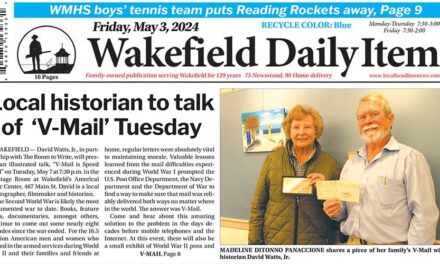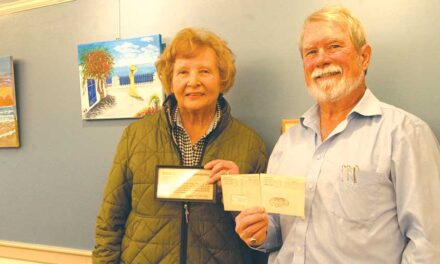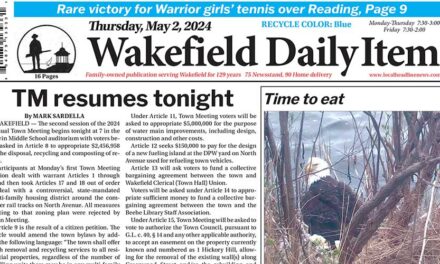Published in the November 10, 2020 edition.
By MARK SARDELLA
WAKEFIELD — Convening last Saturday morning, it took 214 voters just under four hours to complete work on the 11-article Regular Town Meeting warrant. Attendees were offered socially distant seating inside the field house at Wakefield Memorial High School, although many took advantage of the mild temperatures and participated from seating in the parking lot under a tent equipped with video monitors.
Under Article 1, voters heard and voted to accept Town Administrator Stephen P. Maio’s wrap-up report on the FY 2020 budget.
Article 2 asked voters to approve the use of $2 million from the Free Cash account to balance the FY 2021 budget. Article 2 passed with no discussion.
The Permanent Building Committee was the sponsor of Article 3, which sought $2 million to conduct a feasibility study for the proposed reconstruction of Wakefield Memorial High School at 60 Farm St. The high school has been accepted into the Massachusetts School Building Authority’s funding program and the feasibility study is a requirement in determining funding eligibility.
PBC chairman Joseph Bertrand presented Article 3 and said that, once funding was approved, it would take 20-24 months for an architectural firm to complete the feasibility study. He said that the $2 million price tag was in line with feasibility studies of a similar scope for other projects in the state.
Water Street resident Robert McLaughlin asked if the town had looked into the Model School Program. The Model School Program adapts and re-uses designs of successful, recently constructed schools.
Bertrand said that looking at the Model School Program would be part of the feasibility study.
McLaughlin said that he was appalled that the state makes towns go through expensive feasibility studies when money could be saved using pre-existing designs from the Model School Program.
He was also appalled by the fact that over $200,000 had recently been spent refurbishing Walsh Field, knowing that it will likely be the site of a new high school.
When put to a vote, Article 3 passed by a vote of 200-1.
Under articles 4 and 5 Town Meeting voted to accept the provisions of state law that would afford real estate tax benefits to veterans and veterans’ families. Both articles were presented by Director of Assessments Victor Santaniello and passed after a brief discussion.
Article 6 sought to amend the Zoning Bylaw to allow the Zoning Board of Appeals to grant by special permit certain kinds of dimensional relief sought by banks in the business district. Robert DiBella, president of The Savings Bank, presented the article and showed plans to expand the bank’s downtown office in the rear after it’s recent acquisition of the former Hartshorne Insurance property.
Bronwyn Della-Volpe of Cyrus Street objected to changing the Zoning Bylaw “to make it more convenient” for The Savings Bank. She maintained that there was already a way for the bank to achieve the zoning relief it would be seeking.
Paul DiNocco of Wiley Street, a member of the Town Council, said that the bank would not be getting “special treatment” and would have to go through the ZBA process like anyone else.
In response to a question from Benny Wheat of Meriam Street, Town Counsel Thomas Mullen explained the differences between a special permit and a variance. He noted that a special permit is much more difficult to overturn than a variance.
Robert Mitchell asked if any town officials had deposits in local banks. Town Moderator William Carroll overruled the question but Mitchell insisted that “It comes down to favoritism.”
Joanne Scouler, a member of the Planning Board asked why banks should get a break and not have to go through the same process as any other institution on town.
Attorney Brian McGrail, representing The Savings Bank, explained that an applicant can spend a lot of money preparing for a variance only to be denied, whereas a special permit allows for negotiation with the ZBA.
Ultimately, Article 6 passed 119-50, clearing the two-thirds majority requirement for zoning amendments by eight votes.
Article 7 was sponsored by the Town Council and sought Town Meeting approval for $2,150,000 to settle a lawsuit brought against the town by Woods, LLC.
Town Counsel Thomas Mullen explained that the suit relates to an 11-acre parcel of land off Butler Avenue purchased by Woods, LLC in 2017 for the purpose of development. However, it was discovered that a portion of the site was contaminated with asbestos and other materials. Woods alleged that the contamination was caused by the illegal dumping of debris from the 1971 fire that destroyed the Atwell Building (then part of Wakefield Memorial High School). Woods demanded that the town clean up the site at a cost in excess of $4 million.
The town vigorously contested the allegations, but Mullen advised Town Meeting that the Town Council and the specialized attorneys retained by the town agreed that a settlement was the most prudent route to avoid liability. Mullen said that the town would purchase the land from Woods LLC for $2,150,000 and then cap the contaminated area at a cost of about $500,000. The town could then retain the land or resell it to a developer.
In response to a question from the floor, Mullen said that no one knows exactly how the contamination got there nearly 50 years ago, but warned that if the case went to trial, there was a substantial possibility that the material could be linked to the town. He strongly recommended that the town approve the funds to settle the case. Because the money to be borrowed by the town, a two-thirds majority was required.
Article 7 passed unanimously.
Articles 8 and 9 were covered in yesterday’s Daily Item.
Articles 10 and 11 were citizen petitions spearheaded by the Friends of Lake Quannapowitt to amend the Zoning Bylaws in ways designed to prevent or limit devlopment around Lake Quannapowitt. The articles were triggered by a yet-to-be-filed plan by real estate giant Cabot Cabot & Forbes to redevelop the former American Mutual/Comverse site at 200 Quannapowitt Parkway for 485 residential units.
However, because the articles were submitted at the eleventh hour, the Planning Board did not conclude its public hearing on the articles prior to Town Meeting. Absent a recommendation from the Planning Board, Town Moderator William Carroll said that articles 10 and 11 could not be considered at Town Meeting.




